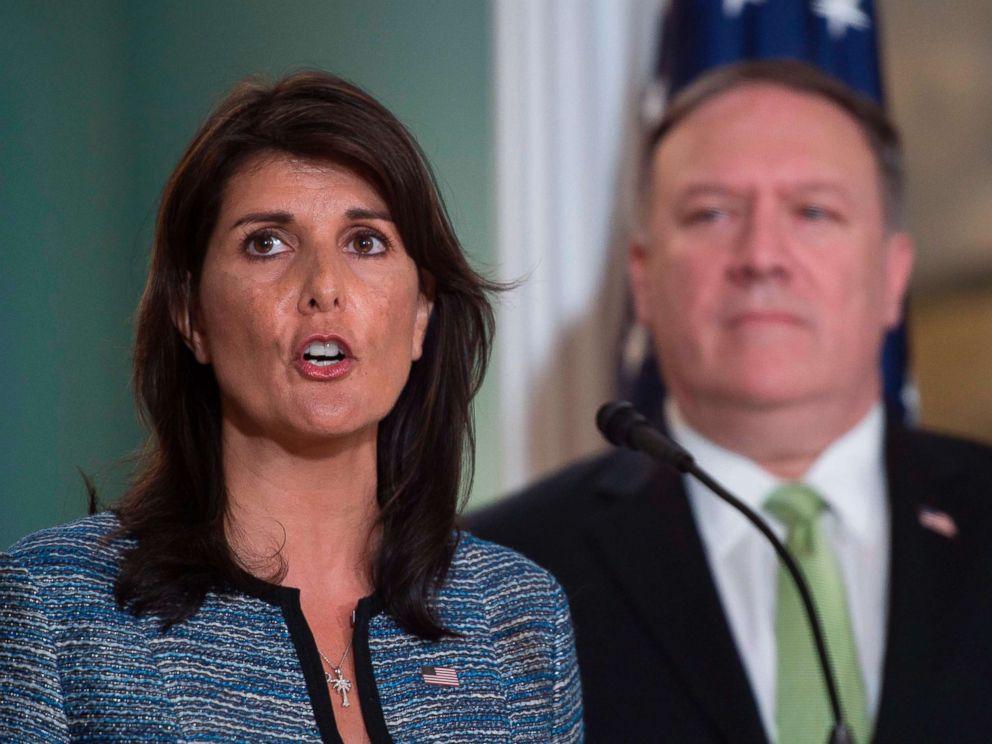US withdraws from UN Human Rights Council
The US withdrew after threatening to do so for more than a year.
The U.S. will withdraw from the United Nations Human Rights Council, Secretary of State Mike Pompeo and U.S. Ambassador to the U.N. Nikki Haley announced Tuesday.
The decision to exit the U.N. body comes after more than a year of threatening to do so, calling for reform, and accusing it of an anti-Israel bias -- but it also follows one day after its High Commissioner criticized the U.S. over President Donald Trump's immigration policies, especially the one that has led to separating of families at the U.S.-Mexican border.
Haley blasted the U.N. body as a "hypocritical and self-serving organization that makes a mockery of human rights" and "is not worthy of its name," while Pompeo slammed it as "an exercise in shameless hypocrisy" and said it had become "an obstacle to progress and an impediment to change" by providing cover for repressive regimes.
After repeated warnings by the Trump administration, Haley said, "Regrettably, it is now clear that our call for reform was not heeded."
The administration has argued that the body, which issues a report on Israel at every session, is inherently biased against the U.S. ally. But it's also criticized it for including repressive regimes among its ranks and not speaking out against member states. In her remarks Tuesday, Haley specifically cited countries like Venezuela and the Democratic Republic of the Congo, both of which are members of the body.
"When a so-called Human Rights Council cannot bring itself to address the massive abuses in Venezuela and Iran and it welcomes the Democratic Republic of Congo as a new member, the Council ceases to be worthy of its name," she said.
She lamented that no country would publicly join U.S. efforts to reform the body, even while many expressed support, she said. Specifically, she called out Russia, China, Cuba, and Egypt for blocking reform efforts, saying they'd done so to protect their own bad behavior.
The Human Rights Council was created in 2006 after its precursor, the Human Rights Commission, was disbanded by then-Secretary General Kofi Annan because of a "credibility deficit." The body consists of 47 member states, with a specific number of seats given to each region of the world. Members are elected by the U.N. General Assembly for three-year terms and cannot serve more than two terms in a row.
When it began, President George W. Bush's administration boycotted it because its membership included countries with poor human rights records. It was only in 2009 that the U.S. joined the organization under President Barack Obama, whose administration argued that U.S. membership could better steer it.
But since Trump came into office, his administration has threatened to withdraw if it did not reform: "If the Human Rights Council is going to be an organization we entrust to protect and promote human rights, it must change. If it fails to change, then we must pursue the advancement of human rights outside of the Council," Haley said at a speech in Geneva last year.

The Human Rights Council opened its latest three-week session Monday, and the High Commissioner Zeid Ra’ad Al Hussein blasted the U.S. in his opening remarks for its "unconscionable" immigration policy of separating migrant parents from their children at the border, calling it "government-sanctioned child abuse."
Related Stories
Neither Haley nor Pompeo referenced Al Hussein's remarks or answered a reporter's shouted question about them, but Haley accused the body of "attack[ing] countries that uphold human rights and shield[ing] countries that abuse human rights."
Pompeo also seemed to take a shot at Al Hussein's criticism, saying, "When organizations undermine our national interests and our allies, we will not be complicit. When they seek to infringe on our national sovereignty, we will not be silent."
A State Department official said prior to their address that the withdrawal was something long under consideration: "You don't make those decisions in reaction to one person's comments," they said.
Haley added that the U.S. would rejoin if the reforms it has called for were made, but the withdrawal is effective immediately.
The decision was criticized by human rights groups, who argued it was part of a pattern by the Trump administration of undermining human rights protections.
"Once again President Trump is showing his complete disregard for the fundamental rights and freedoms the U.S. claims to uphold," said Amnesty International's Secretary General Salil Shetty in a statement. The U.S. "is willfully choosing to undermine the human rights of all people everywhere and their struggles for justice."
Some even questioned whether the U.S. departure would negatively affect ongoing investigations into human rights abuses.
"A decision to withdraw from this vital body undermines the international community’s ability to take collective action against grave human rights abuses," said Dr. Homer Venters, Physicians for Human Rights' director of programs. "With current investigations into alleged atrocities in Myanmar against the Rohingya, a humanitarian crisis in Yemen, and assaults on health care and civilians in Syria, including chemical attacks, there is no time more pressing than the present for nations to redouble their efforts to unite in defending human rights around the world."
Foreign leaders, too, expressed disappointment with the move, with U.N. Secretary-General Antonio Guterres saying through a spokesperson that he "would have much preferred for the United States to remain in the Human Rights Council. The U.N.'s Human Rights architecture plays a very important role in the promotion and protection of human rights worldwide."
But the administration did get one vocal and almost immediate response in support of its decision. Israeli Prime Minister Benjamin Netanyahu tweeted just minutes after the announcement, "Israel thanks President Trump, Secretary of State Pompeo, and Ambassador Haley for their decision against the hypocrisy and lies of the U.N. Human Rights Council. For years, the Council has proved itself to be a biased, hostile and anti-Israeli body that is betraying its mission to protect human rights."
